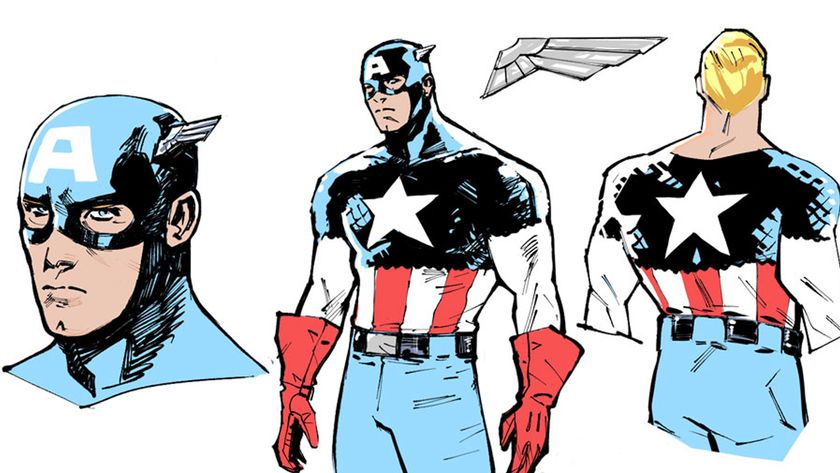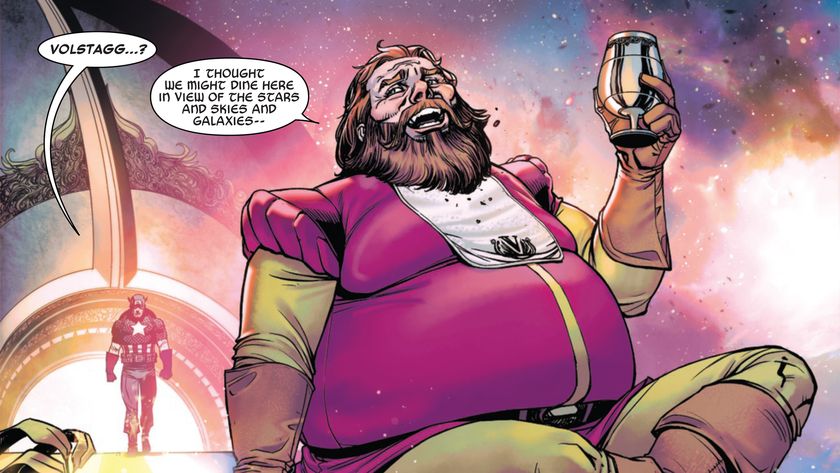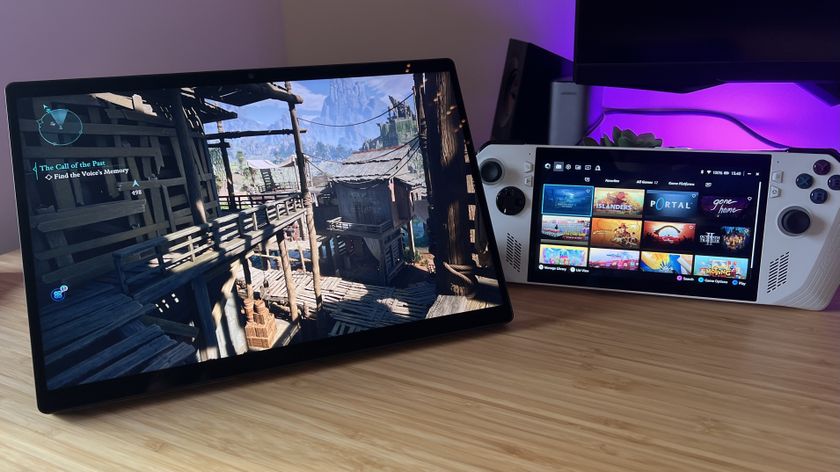Artist mutates his Witcher fandom into a new comic called RDW - A Tale of Lost Fantasy
A fantasy story dealing with PTSD, mental health, drug addiction, and monsters in RDW: A Tale of Lost Fantasy
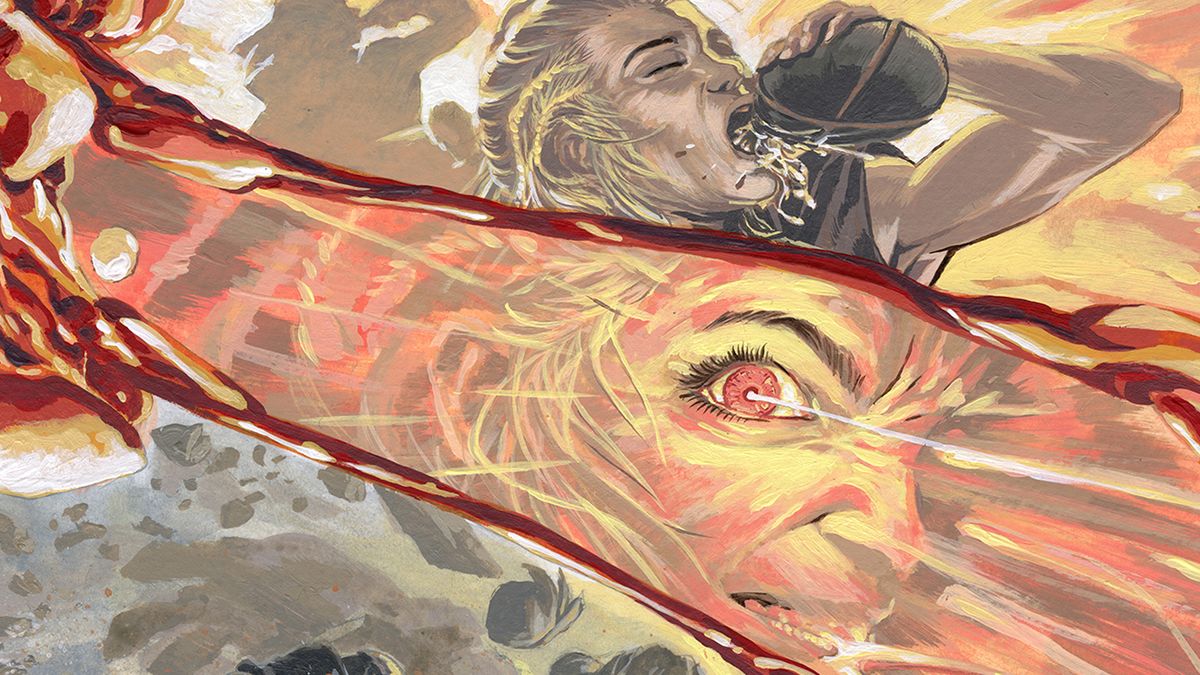
The Witcher novels and games are known to inspire fans with their own ideas for stories set in those universes, and comic writer/artist Marco Rudy has taken that inspiration and run with it.
Much like Geralt of Rivia's upbringing, Rudy took his infant idea and mutated and molded it into his own original, fully-painted creator-owned story independent of Andrzej Sapkowski and CD Projekt Red's stories and universes, turning his concept into an original graphic novel titled RDW: A Tale of Lost Fantasy.
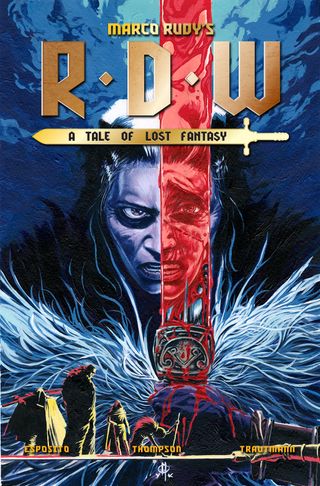
"[RDW] follows Astrid, a free-company commander, a leader currently without an army, her struggle with addiction to the enhancing drug that makes her free-company unique and the burden of leadership," Rudy says. "The drug acts as some sort of juiced-up methamphetamine; the story will be delving deep into the effects the drug has on the body, the mind, and the social circles of those affected by it."
As Astrid charts through the world of RDW, she'll meet mythical creatures inspired not just by European lore, but also concepts inspired by African and South American cultures as well.
RDW: A Tale of Lost Fantasy was successfully crowdfunded on Kickstarter, and Rudy is now sending out copies to backers and making it available to the general public through an online store, convention appearances, and partnering with some comic shops. Newsarama spoke with Rudy for more on the story of RDW, and the story of him bringing it to life.
Newsarama: Marco, can you tell us about Astrid - the star of RDW: A Tale of Lost Fantasy?
Marco Rudy: I'll see what i can say, without spoiling the thing… Astrid is essentially a commander of a task force; in a way, a military unit. What type of unit? We'll find out if we ever get to continue this story.
Comic deals, prizes and latest news
Get the best comic news, insights, opinions, analysis and more!
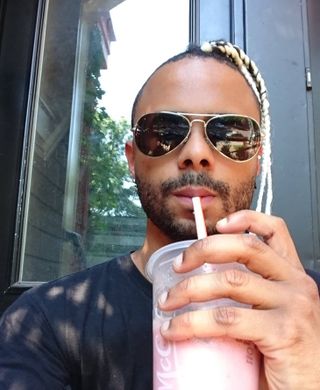
But as it is, Astrid is burdened by responsibility and failure. She's a flawed commander and that finally caught up to her. She's also not in the best mental state. All of that, and more, we'll find out the 'why" - again, should this thing ever continue. Saying more is a bit too spoiler-y.
Newsarama: In RDW, Astrid uses a drug that gives her physical gifts but is also addictive - like Captain America's Super Soldier Serum, but darker. Tell us more about that?
Marco Rudy: It's more like a spiked version of the magic potion used by Asterix and Obelix - the idea is to provide some sort of invincibility. But as ever, there is much more to this potion and its reason for existence, than meets the eye.
As it is, it's essentially a magically boosted super-methamphetamine and the addiction it causes is one of the main focuses of the whole story in RDW; throughout it, Astrid deals with the effects of said addiction and the withdrawal. As we see this, and as the story goes, we get a glimpse of more about what I mentioned above, what's the thing about the potion and why Astrid and her companions used it?. I've already said too much! [Laughs]
Newsarama: You've told me previously that RDW came about partly because you wanted to do a comic based on The Witcher but were unable to. Can you tell us about that idea, and how it morphed into RDW?
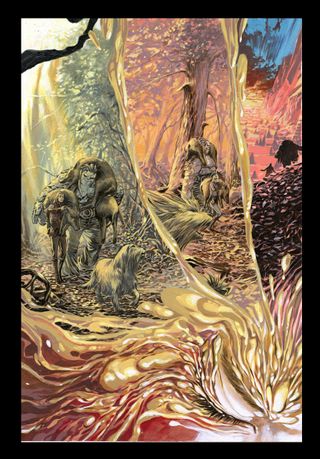
Marco Rudy: If anyone knows me or follows me on social media, they're aware of just how much I love The Witcher novels by Andrzej Sapkowski. When I came to know that CD Project SA (the gaming company behind the games and currently in partnership with Dark Horse, publishing the comics) was going the comic route I tried my best to woo them and Dark to have me be their artist - heck I wanted to do anything set in that universe, even just cover work.
Alas, it wasn't to be.
The good thing was that, as I was pitching myself to do that, I also pitched a few stories to Marvel and started working on a creator-owned that eventually became RDW. The Marvel thing got picked up but never moved forward and I got more and more into what I was creating and I noticed that I was mimicking the approach Sapkowski had, in world-building. I figured that, if I wasn't going to tell a story in-universe, for The Witcher, why not create my own, follow in the master's footsteps, but add my own flavor to things?
RDW got more and more shape - it went from a story featuring what was then a failed 'witcher' per se, to Astrid a failed commander dealing with addiction, a subject matter that could easily fit into Sapkowski's take, But it was my own.
Newsarama: I'm not a Witcher expert, but I see PTSD all over the original stories and the game - but this element of addiction is something new. How did the use of drugs became such a big story element for RDW?
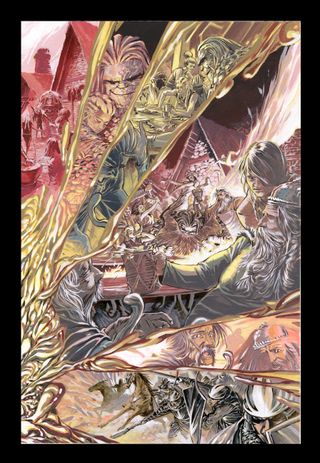
Marco Rudy: Both are. Again, trying my best to not spoil things, as a lot of this comes alive, in further books - should I ever get to them - one bit of commentary I am doing with this book is the expendable nature of soldiers, especially currently, and what they do to cope.
It's all good to mow down your enemies with your sword, bow, and magic, and revel in the violence afterward, with your companions, at a tavern, later. But, every killing leaves a mark. And it eventually takes a toll.
So, this is my bit of 'real world' into this story I am trying to tell. I researched quite a bit the effects of war and battle in veterans, American and Canadian; from books to interviews, and personal interviews with veterans I know, to get a feel at what they go through, so I could convey just a bit of it, in this story. So, it was all related, the use of drugs, mental health, and PTSD, from the get-go.
Newsarama: This is a drug story, but played out in a dark fantasy realm with dragons, living forests, and more. How do you balance the very real nature of drug addiction with such fantastical elements? Do you make the reality more fantastical, or the fantastical more grounded?
Marco Rudy: The latter. There are dragons and creatures of folklore around and they influence every bit of the way this world works. But in all honesty, it's all more dressing to try to tell personable and relatable current-issues stories.
Newsarama: Whereas The Witcher is based primarily on European mythology, RDW is pulling from Mozambique, Brazil, and First Nations folklore - which is great. Can you tell us about incorporating that into this?
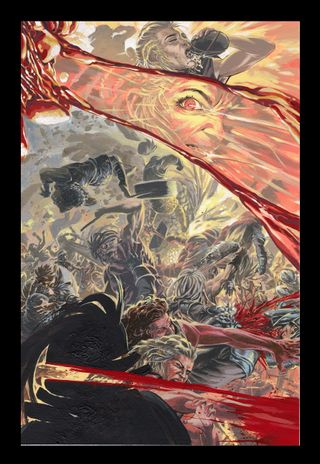
Marco Rudy: As a way in, RDW still incorporates many elements of European myth and folklore, but here and there - and more and more, as the story goes - I sprinkle in the stuff we're not so used to seeing in fantasy type books.
My elves are physically different from the usual, as they are a mix of the JR Tolkien and Sapkowski elves, with African-feline creatures, for instance.
Or my take on orcs is a mix of the pre-conceived notion European colonizers had of African people, with some African folklore/Jack Kirby vibes to them.
And then there are folk stories and even urban legends that i take from literally everywhere, to make the world as is.
There's a religion funded by a character that if you've lived in Mozambique in the '80s, you're going to find very familiar and it'll bring a smile to your face. I try to balance this, keep it coherent enough that it makes sense. Hopefully, it does. Most of what I'm saying to you, you won't really see in the first RDW book though. Some of it is planted, but book two will elves and some of their struggle. But that is for whenever; if book two ever sees the light of day.
Newsarama: I skipped this, but it's not too late to ask - what is Astrid fighting in RDW?
Marco Rudy: Well, saying more, outside of what I have mentioned earlier, would be too spoiler-y. Herself? The book tackles addiction, PTSD, and all derivatives from that. I guess that's the answer?
Newsarama: You crowdfunded RDW, and are now publishing it through your new company Les Editions Xicandarinha. What led you to do go this route, and self-publish?
Marco Rudy: After contacting several publishers, all interested, but never going past 'maybe', I started having loads of anxiety about the idea of telling a story of my own. To be honest, i am still terrified of putting this book out there, regardless of the positive reaction teh backers that have received their copies have shared with me.
'I'm just an artist' is what echoes in my mind, and most times not even that good of an artist - so, coming up with a story, then writing it, painting it, printing it, and selling it…. Everything is on me. If anything is out of place, or doesn't look or sound as good as it should, it's because I messed it up, so, from time to time I just feel overwhelmed.
That said, I have been working for other companies and telling other peoples' stories for the better part of 15 years. I started as a penciller and then learned how to ink my own pencils. Then I learned how to paint my own pencils and inks - all the while studying the scripts and writing of my favorite creators. I think it was a natural step to try my hand at telling a story of my own. So, here we are.
Newsarama: Why was it important for RDW to be all you, in terms of writing, art, and more?
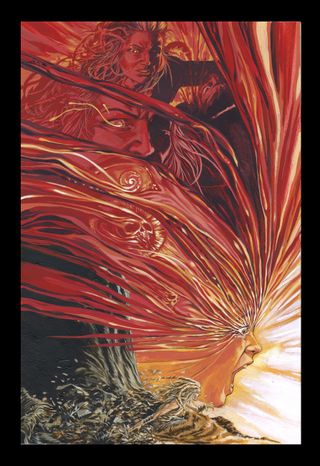
Marco Rudy: It just feels right. Like, I am finally telling a story I want to tell, the way I want it to be told, and, for the most part, on my time to tell it. I guess the final judgment on how I am as a teller of stories arrives, when the general public reads it and, um, tells me how much it sucks. Hopefully, it doesn't. [Laughs]
Newsarama: So this is being sent out now to your Kickstarter backers, but for those that didn't pre-order it through that, where can they pick it up? Will it be sold in bookstores or online, or at conventions?
Marco Rudy: The book is available to everyone now via an online Gumroad store I've set up; both versions, digital and physical.
I will have with me at the sole convention that I'm doing this year - Montreal Comicon in early December, and throughout convention times next year, provided COVID security measures are in place at conventions. Some retailers backed the project on Kickstarter and they're getting their copies, any other retailers interested can just drop me a line.
Chris Arrant covered comic book news for Newsarama from 2003 to 2022 (and as editor/senior editor from 2015 to 2022) and has also written for USA Today, Life, Entertainment Weekly, Publisher's Weekly, Marvel Entertainment, TOKYOPOP, AdHouse Books, Cartoon Brew, Bleeding Cool, Comic Shop News, and CBR. He is the author of the book Modern: Masters Cliff Chiang, co-authored Art of Spider-Man Classic, and contributed to Dark Horse/Bedside Press' anthology Pros and (Comic) Cons. He has acted as a judge for the Will Eisner Comic Industry Awards, the Harvey Awards, and the Stan Lee Awards. Chris is a member of the American Library Association's Graphic Novel & Comics Round Table. (He/him)
Most Popular








